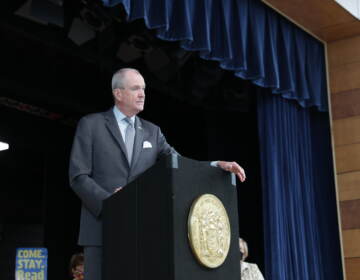Classrooms and courtrooms: 2020’s flashpoints for New Jersey education?
Governor and Senate president about to kick off new year with a battle over school funding? What other testing issues are in the offing?

Are Gov. Phil Murphy, right, and Senate President Steve Sweeney on a collision course over issues in education? (Edwin J. Torres/ Governor's Office)
This article originally appeared on NJ Spotlight.
–
For all their differences elsewhere, Gov. Phil Murphy and state Senate President Steve Sweeney have by and large become aligned — or at least at peace — on many of the big issues in New Jersey public education.
After a rough start, Murphy and Sweeney for the last two years sided together on a strategy to fully fund the state’s $9 billion school finance formula. They have each embraced preschool expansion and backed more help for specific needs such as special education. And, at least of late, there have been no major flare-ups between them over issues like student testing or charter schools.
The one big exception, of course, is how to fund the state’s pension and benefits for teachers and other public employees, a perennial point of contention for which no resolution seems in sight. Add in the New Jersey Education Association, the governor’s ally and Sweeney’s nemesis, and things can heat up fast.
But entering 2020, there are a few other policy — and political — tinderboxes in the offing for New Jersey public education. They range from new challenges to the school funding peace to a host of questions for both educators and policymakers.
Here are a few of the pressing questions to be faced in the new year.
School funding deal in jeopardy?
The state’s plan for financing schools remains a dominant issue, and for good reason. The state’s support for schools amounts to a third of the state’s overall spending every year.
So it has been no small accomplishment that Murphy and Sweeney have agreed on a long-term strategy for fully funding the state’s 2007 school finance law, adding more than $200 million this year and a sizable sum likely on tap for the next.
But a new rift has emerged between the two over a recent move by Sweeney to smooth some of the strategy’s roughest edges, namely for the scores of districts whose aid has been cut. In the lame-duck legislative session, the Senate president last month proposed help for about 40 districts that have seen aid reductions under the plan, putting forward a bill that would waive the state’s existing 2% cap on local property taxes in those districts. The measure passed in both chambers before the end-of-year break, and even had the NJEA somewhat on board.
It’s not a done deal, however. Three days later, Murphy’s office said that he planned to veto the measure and indicated he may use it as leverage for a statewide millionaires tax that Sweeney has long resisted.
Yesterday, Murphy’s office did not back down and alluded to previous remarks against the Sweeney bill. “We do not support the Senate President’s plan to raise property taxes,” said the governor’s communications director, Mahen Gunaratna.
What happens next is unclear. If the governor vetoes the measure, can Sweeney and Assembly Speaker Craig Coughlin get the necessary votes to override that veto? The final yes-vote counts on the bills — 24 in the Senate and 41 in the Assembly — were both short of the required two-thirds necessary for an override.
Either way, what will it do for the pair’s broad agreement on an overall funding plan for schools, starting with the next state budget? The first clues will likely come in Murphy’s State of the State address on Jan. 14, followed by the state budget presentation itself in March.
Is regionalization the best (or just latest) hope?
Will 2020 be the year when efforts finally get off the ground to regionalize and consolidate New Jersey’s 500-plus school districts?
Sweeney would like to think so, and he has staked much of his “Path to Progress” reform campaign on such movement in 2020. The Senate president told the New Jersey School Boards Association in November that he is optimistic; as a first step, he has lined up Salem County’s mayors and school superintendents to at least study the idea of a countywide district as a way to make savings and efficiencies.
“I have a school in Salem County that graduates 13 kids a year,” Sweeney told the delegates. “Thirteen.”
But Salem is the state’s smallest, most-rural county — with less than 11,000 students and 33 schools in all — and Sweeney acknowledged that getting districts statewide to even just study the idea of consolidation will be a steep challenge. His proposal calls for a mix of mergers, be they countywide or just among neighboring communities.
“Is there something wrong with just looking at it, if it makes sense?” Sweeney asked the NJSBA delegates, needing to convince many in the room. “We have to look at things differently today. We are not efficient and more importantly doing what’s best for the kids.”
Many districts have by and large been tepid toward the idea, focusing instead on more immediate needs. Betsy Ginsburg heads up the Garden State Coalition of Schools, an influential group of suburban districts, and said Sweeney’s pledges to help defray extraordinary special education costs are more promising.
“The special education recommendations are of interest to my members because of the enormous spikes they are experiencing in special ed costs,” she said. “That has a real impact and a subject of real interest.”
Courtroom battles
For all the attention on the governor and the Legislature, the courts have been arguably the most consequential branch of government when it comes to education in this state. Abbott v. Burke of the 1980s, 1990s and 2000s are Exhibits A, B and C.
Well, the 2020s could soon make their mark, too.
Abbott v. Burke, inarguably among the nation’s preeminent school equity cases, is back before the New Jersey Supreme Court in a filing over the state’s stalled school construction efforts.
The Education Law Center, the advocacy group representing the students of 31 mostly urban districts at the center of the case, filed the complaint in November and is expected to start making its arguments in the new year that the state has failed to live up to its promises under previous Abbott rulings to provide adequate school buildings and facilities to needy districts. The next step is for the state to file its response by the end of this month. If the court sides with the plaintiffs, the required financial investment likely will run into the billions of dollars.
In addition, state Superior Court Judge Mary Jacobson in Trenton is hearing what could be its own landmark case over the infamous segregation in New Jersey’s classrooms, which by some measures is among the worst in the country.
Settlement talks broke down last spring, and Jacobson in October heard initial arguments for summary judgments. Oral arguments are expected early in 2020.
What else?
There are plenty more topics on the agenda for New Jersey education in 2020.
Will the Murphy administration finally get a new student testing program in place or at least in process? For a governor who said he would replace the state’s previous testing regime immediately on his taking office, his administration has taken its time on this one.
Charter schools have also been left in limbo, with their preeminence in cities like Newark and Camden well-established but their growth stalled elsewhere and political support waning.
And of course, there’s a giant question to be answered in November: Who will be president and what will that mean for education in the state and nationwide?
While K-12 education hasn’t been subject to a big national conversation so far under President Trump, with Education Secretary Betsy DeVos focusing more on higher education issues, a second Trump term certainly would embolden a Trump administration on pet favorites like charter schools and school vouchers, the latter of which would allow students to attend public or private schools outside their districts.
Even if pushed by Trump, vouchers are one measure not likely to get very far in New Jersey these days. But one thing has become certain as we go into the new year: Not much appears off the table anymore in education, either on the national level or the state one.
WHYY is your source for fact-based, in-depth journalism and information. As a nonprofit organization, we rely on financial support from readers like you. Please give today.




